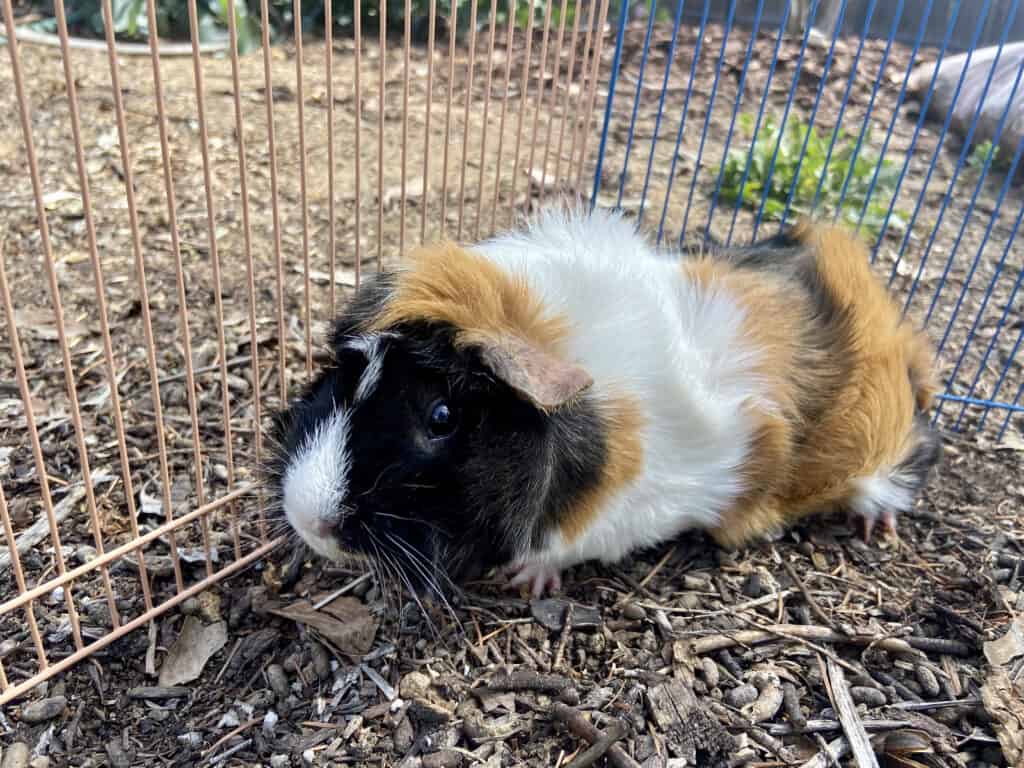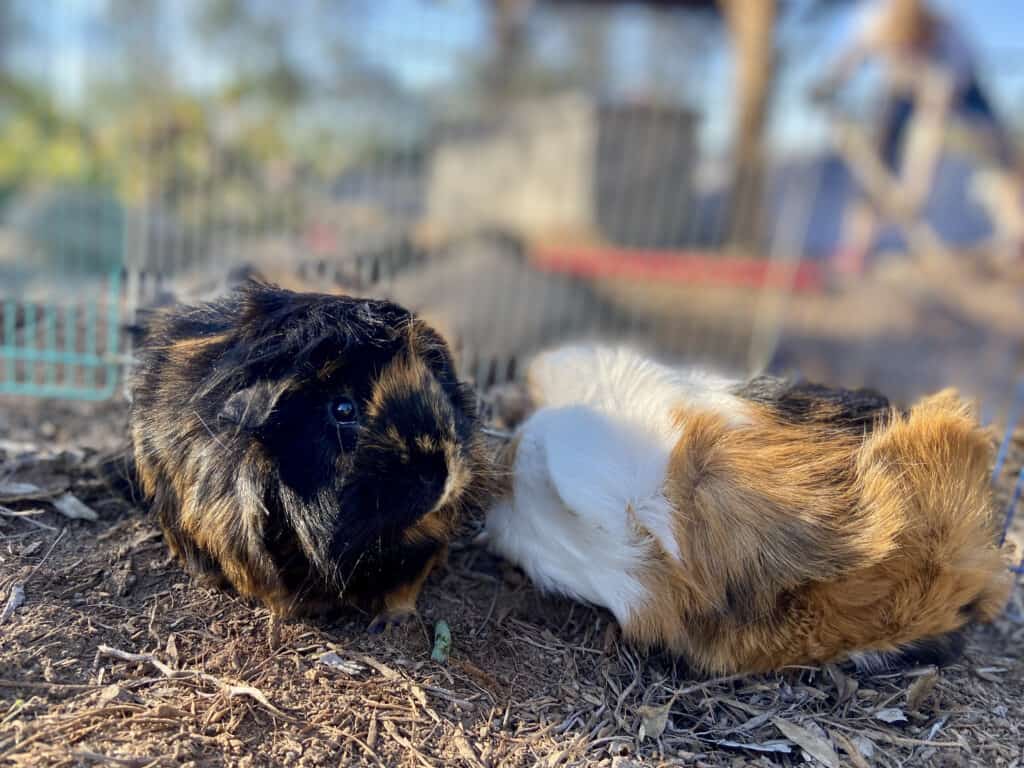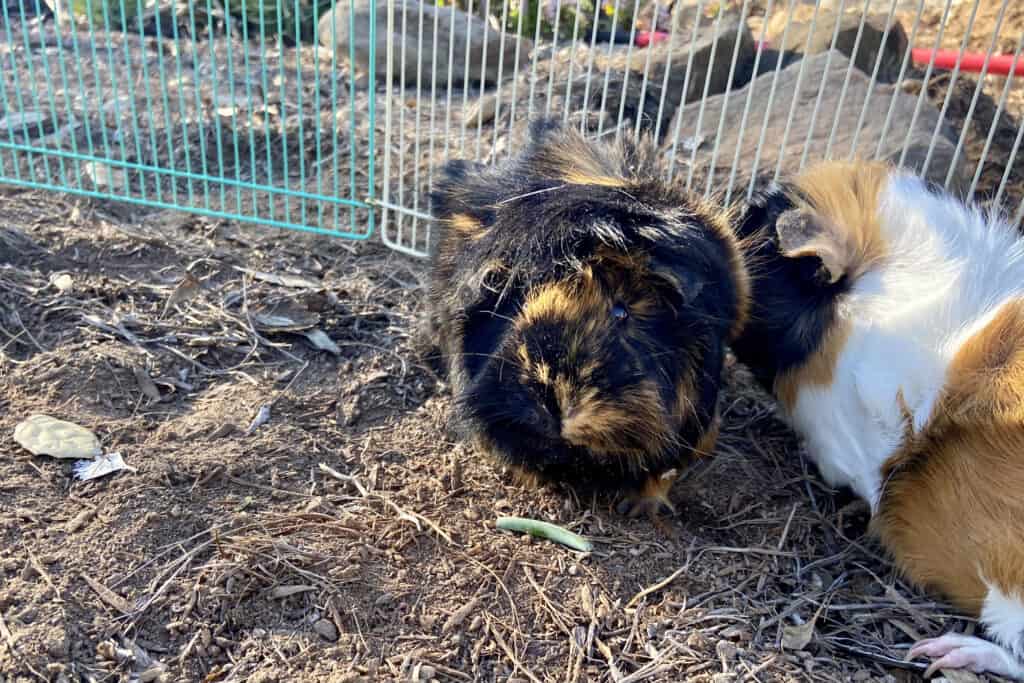As an Amazon Associate we earn from qualifying purchases.
Cantaloupe is a popular summertime fruit that’s not only refreshing and delicious but also packed with nutrients. But can guinea pigs eat cantaloupe too? Let’s find out!
Can A Guinea Pig Eat Cantaloupe?
Guinea pigs are rodents that are popular pets in many households. These small animals are gentle and have a docile personality, making them ideal for families with children. One of the most common questions that new guinea pig owners have is what kind of food these cute critters can eat.

Cantaloupe is a type of melon that is often included in fruit salads or as a refreshing summer snack. Many people wonder if this sweet fruit is safe for guinea pigs to consume.
The answer is yes, guinea pigs can eat cantaloupe! This juicy fruit is packed with nutrients that are beneficial for your pet, such as vitamin C, potassium, and beta-carotene. Cantaloupe also contains water, which is important for keeping your guinea pig hydrated.
Feeding Guinea Pigs Cantaloupe
A diet rich in cantaloupe can help keep your guinea pig healthy and active. Cantaloupe is an excellent source of vitamins A and C, both of which are important for guinea pig health. Vitamin A helps maintain vision and skin health, while vitamin C is necessary for the proper functioning of the immune system.
When feeding this to your pet, it is important to remove all the cantaloupe seeds and cantaloupe rinds first. Cantaloupe seeds can be a choking hazard and can also contain harmful toxins that can make your guinea pig sick. Cut the cantaloupe into small pieces so that your pet can easily eat it. Offer a small amount of cantaloupe at first and then increase the amount as your pet gets used to it.
Cantaloupe is a healthy treat that your guinea pig is sure to enjoy. Be sure to remove all the seeds as well as cantaloupe skin before feeding and offer a small amount at first. With a little bit of cantaloupe, your furry friend will be healthy and happy!
Benefits Of Cantaloupe
Cantaloupes are an excellent source of vitamins A and C, as well as beta-carotene. They are also a good source of potassium and fiber. All of these nutrients are important for guinea pigs, and cantaloupe can be a delicious and healthy treat.

Some other benefits of cantaloupe for guinea pigs include:
- It is a good way to hydrate your pet. The high water content in cantaloupes can help keep your pet properly hydrated, especially during hot summer months.
- It can help boost your guinea pig’s immune system. The vitamins and antioxidants found in cantaloupe can help strengthen your guinea pig’s immune system and help them fight off sickness.
- It can aid in digestion. The fiber in cantaloupe can help keep your pet’s digestive system healthy and improve its overall gut health.
- Cantaloupe can help with weight management. The high water and fiber content in this fruit can help your pet feel full and satisfied, which can lead to lower food intake and weight loss.
Overall, it is a healthy and delicious treat that can offer many benefits for your pet. If you are looking for a way to add more vitamins, minerals, and antioxidants to your guinea pig’s diet, cantaloupe melons are a great option.
Too Much Cantaloupe: What Will Happen?
Guinea pigs are very fond of cantaloupe and will often beg for more even when they are full. However, feeding too much to your pet can lead to health problems such as diarrhea, bloating, and gas.
If your pet consistently has loose stools after eating this, it is best to reduce the amount you are feeding or switch to another type of fruit.
Other Fruits For Guinea Pigs
Guinea pigs can eat apples, bananas, blueberries, carrots, grapes, honeydew melon, mango, papaya, strawberries, watermelon, and other fruits. Fruits high in sugar should be given sparingly.
When feeding them any new fruit, always introduce it slowly to avoid stomach upset. Wash all fruits thoroughly before feeding them to your guinea pig.
Guinea Pig Diet
Most guinea pigs need hay to help with their digestion and to prevent gastrointestinal problems. The best type of hay for them is timothy hay. You can find this type of hay at most pet stores.

Fresh vegetables are also an important part of their diet. Some good vegetables for your furry pet include broccoli, carrots, spinach, and turnip greens. Avoid giving them iceberg lettuce, as it does not have much nutritional value.
A small number of guinea pig pellets should also be given to your guinea pig each day. Be sure to choose a pellet that is made specifically for them and avoid ones that contain nuts, seeds, or dried fruits.
Water is also an important part of their diet. You should provide your pet with fresh water every day. A water bottle with a metal spout is the best way to give your pet water.
Avoid using plastic water bottles, as they can leach chemicals into the water. When giving your pet vegetables, it is best to wash them first to remove any pesticides or other chemicals that may be on them. It is also a good idea to chop up the vegetables into small pieces so that your pet can easily eat them.
Keeping Them Happy And Healthy
Guinea pigs are social creatures that need companionship, so it is important to have at least two of them. They also need a spacious cage with plenty of room to run and play. A diet of hay, fresh vegetables, and pellets will keep your pet healthy and happy.
Here are some tips for keeping your guinea pigs healthy and happy:
- Provide a large cage with plenty of room to run and play.
- Give them a diet of hay, fresh vegetables, and pellets.
- Provide them with companionship by having at least two other guinea pigs.
- Keep their cage clean and free of debris.
- Take them to the vet for regular check-ups.
By following these tips, you can be sure that your furry friends will be healthy and happy.
Final Thoughts
In conclusion, guinea pigs eating fresh cantaloupe is a healthy option as it provides them with essential nutrients. However, as with all things, moderation is key, and too much cantaloupe can lead to health problems. Be sure to consult with your veterinarian before making any changes to its diet.